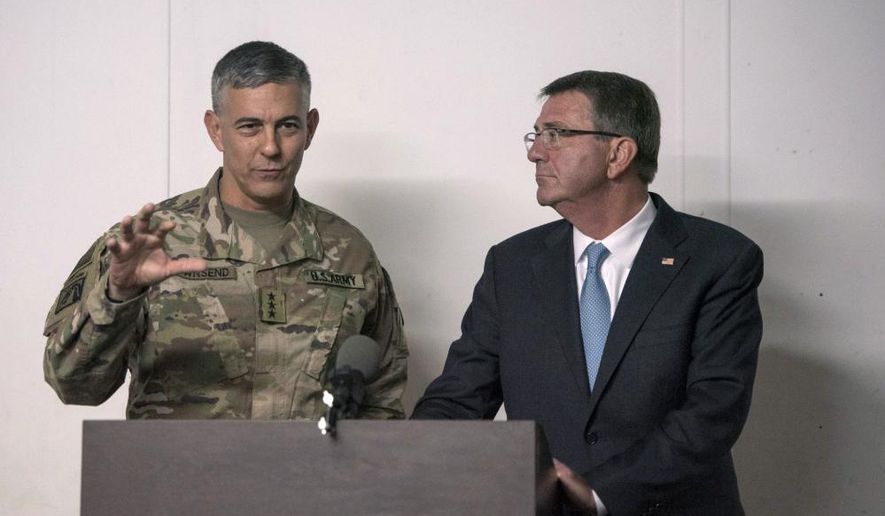WASHINGTON (AP) - Iraq’s battle to reclaim Mosul from the Islamic State group is progressing despite “stiff” resistance from resilient and creative fighters, but a coming offensive to oust them from their main Syria stronghold at Raqqa poses tougher political challenges and could take longer, the U.S. commander of anti-IS coalition forces said Wednesday.
Army Lt. Gen. Stephen Townsend also said American intelligence has detected indistinct signs of Islamic State plotting against the West from Raqqa, adding urgency to coalition plans to encircle and eventually assault the city.
“We know they’re up to something, and it’s an external plot,” the general told reporters at the Pentagon, speaking from his headquarters in Baghdad. “We don’t know exactly where” they intend to strike, he added. “We don’t know exactly when.”
“We know this plot-and-planning is emanating from Raqqa. We think we’ve got to get to Raqqa pretty soon.” He declined to be more precise about a timeline but said there is “a sense of urgency” due to the uncertainty of the threat.
As the Islamic State group’s two main hubs, Mosul and Raqqa have long loomed as potentially decisive battles. The group has lost considerable territory elsewhere in both Iraq and Syria over the past year, and the U.S. and its coalition partners see collapsing their last major strongholds as a key to extinguishing extremist claims to a caliphate.
Townsend and other coalition leaders are struggling with the timing for Raqqa, not only because of the demands of the large Iraqi-led Mosul operation but also because the political and military landscape in Syria is more complicated. Townsend said more Syrian opposition fighters need to be recruited, trained and equipped for the Raqqa battle, but he and other officials have said in recent days that the Mosul and Raqqa operations will overlap.
“I think it will be within weeks,” Defense Secretary Ash Carter said in Brussels, adding, “Not many weeks.”
Unlike in Iraq, where the coalition has a coherent government to work with, the U.S. and its coalition partners in Syria are relying on a hodge-podge of local Arab and Kurdish opposition groups, some of whom are fierce rivals. The tensions are exacerbated by the presence of Russian and Syrian forces on one side and Turkish forces on another.
“It’s probably fair to say with the complexity and the fact that we haven’t really got it underway yet that it’ll probably take longer than Mosul,” Townsend said, referring to the Raqqa offensive. He and other officials have avoided predicting how long it will take to oust IS from Mosul, but they have suggested it could take a number of months.
Townsend acknowledged that a ground offensive in Raqqa is politically fraught, given the diverse and competing ethnic groups in Syria and demands by Turkey that the Syrian Kurdish fighting force known as the YPG, which the Turks regard as an enemy, not participate in the Raqqa assault.
He said plainly that the YPG will necessarily be part of the offensive.
“The facts are these: The only force that is capable on any near-term timeline is the Syrian Democratic Forces, of which the YPG are a significant portion,” Townsend said. “So, we’re negotiating, we’re planning, we’re having talks with Turkey and we’re gonna take this in steps. And we think there’s an imperative to get isolation in place around Raqqa because our intelligence feeds tell us that there is significant external operations attacks planning going on, centralized in Raqqa.”
Townsend gave a mostly upbeat assessment of progress in the Iraqi push toward Mosul, which began last week. The extremists, who have controlled Mosul for more than two years, are “fighting very hard,” offering “pretty stiff resistance,” he said.
“They’ve pulled out all stops,” he said, including suicide attacks, car bombs, mortars and roadside bombs. He credited IS with innovative uses of small drones. “It’s not episodic or sporadic,” he said. “It’s relatively constant and creative.”
The drones, which he called “a pretty thorny problem,” are being used not only for surveillance and to guide mortar or artillery fire but also as Trojan horses. Townsend cited an example of an IS drone landing, seemingly harmlessly, behind Iraqi lines. It exploded when Iraqi soldiers picked it up for examination, killing or wounding them, Townsend said.
“We expect to see more of this,” he said.
Townsend said the indications of IS plotting Western attacks from Raqqa have not caused the coalition to accelerate its Raqqa operation. He outlined a phased approach to spoiling the plots, starting with “trying to head it off” by using airstrikes against targets around Raqqa.
“We’re going to do those kinds of suppressive fires until we’re ready to mount an approach and isolation of Raqqa,” he said.
Once the city is isolated, he said, a ground offensive will be launched to expel IS from the city it regards as its capital.
Townsend said some aspects of the Raqqa assault plan are yet to be worked out and will be decided by local commanders.
“Syrian commanders will make decisions about what needs to be done there to completely encircle, to partially encircle and to attack from this direction or attack from that direction,” he said. “They’ll make those decisions. We haven’t reached that stage of the planning with them yet.”




Please read our comment policy before commenting.